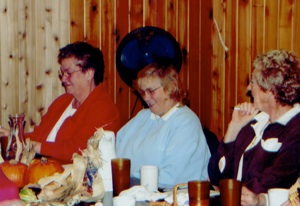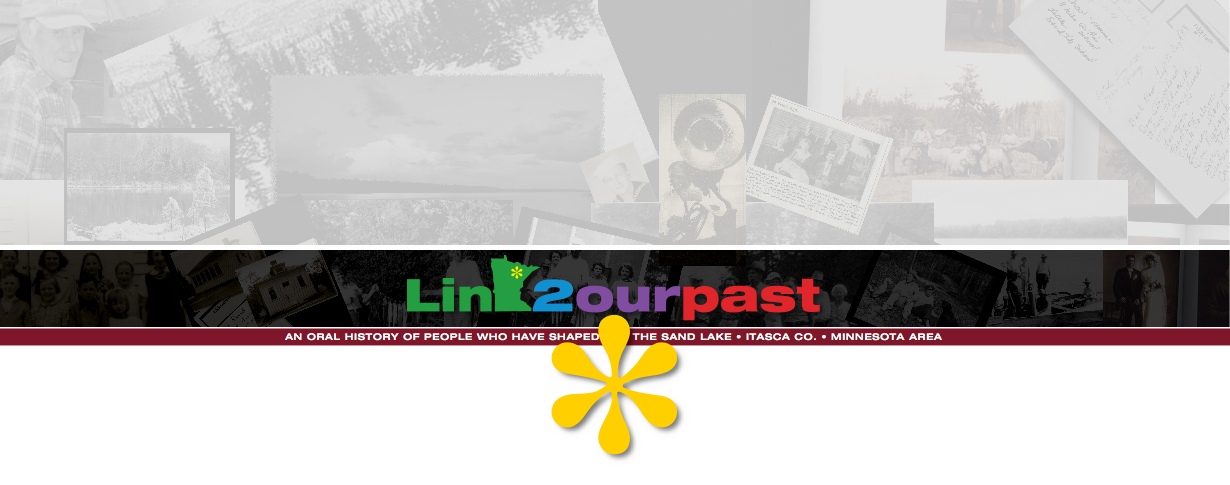In early June 2003, rumors were that a couple from Illinois had bought the Johnson Place on Little Sand. There was a lot of buzz but no one seemed to know the whole story.
No matter. It didn’t take long to find out that Ruth and Rick Hauck belong here. They are outdoors people who enjoy the rugged demands of “Living North.” What’s more, they plan to stay. Neither of them wants to do all that packing up again.
Rick’s love of the outdoor life began early, “As a kid I liked places a lot wilder than my backyard. Both Ruthie and I liked the idea of living in the country. We moved a couple times, raised our family of three daughters, Debi, Cyndi, and Michele. I found that my job (lineman for Commonwealth Edison of Illinois) took more and more of my time. The dream, however, prevailed, and now we live in northern Minnesota, “real country.””
It is an overcast November afternoon. Deer hunting is in the second day. Both Ruth and Rick are at the door inviting Martie Wilson and me (Elinor Wright) into their attractive, welcoming home.
Soon we are at the kitchen table drinking hot coffee and enjoying Ruth’s banana cream pie. We try to take in all that we see around us. Then we ask for a tour.

In the dining room, we are suddenly aware of ten children smiling down at us from Grand Portraits that line the wall. This is the heart of the Hauck home. Ruth introduces us to each one of the grandchildren adding a sentence or two to get us fully acquainted.


Ruth paused, remembering, “Illinois, Wyoming, Michigan, South Dakota and Minnesota.”
Rick went on to share that, in their first year here in Sand Lake, Rick already had an application in to hunt in Wyoming and went out there to hunt during our deer season here. Ruth stayed here and went hunting in their woods and shot a buck that got wedged under a log. She called Rick out in Wyoming to see what she should do. Ken Libersky and Kathy McGibbon came over and helped her get it out from under the log. Curt and Erick Carlson helped her hang it up in the garage with a boat anchor rope. Rick said, “I have hundreds of feet of rope out in the shed, but who knew Ruthie would need it to hang a deer while I was gone?”
It was an afternoon for stories - chilly, snow flurries, gusty Canadian winds. Inside, a deep chair and good company. Ruth refilled the coffee cups for the third time and the stories began.
Rick told of a hunting trip he and a friend Jerry and Jerry’s wife Rita and their son-in-law Brad went on in Alaska. The pilot flew them out to a remote lake, and as he circled the lake, the pilot pointed out a trapper’s cabin and boat and said they could use the boat & do some trout fishing. Almost every cast of the line brought a trout, and after catching four or five, they took them to shore and left them in the boat next to Rick’s backpack. They watched a caribou swim across the lake and head off into the woods and circled around to find it. Then they heard bears splashing near the boat and came back to find Rick’s backpack gone (with his spare ammo, hunting license, money, plane tickets inside). They searched for hours and found the bears had drug his backpack off into the middle of the swamp and left it.
On that same hunting trip, Rick and friend Brad hunted by the lake. Rick told Brad to stay near camp and Rick would walk around the lake through the tall brush and look for moose. Brad caught sight of a bear that was watching Rick and shot it, hitting it in the foot. The wounded bear, only 50 to 100 feet away from Rick, roared in pain. Brad shot again and it roared some more. He shot it again and it fell dead. That was a close call!

On his Alaska trip, the pilot who dropped them off required all the money up front – the money to drop them off, to pick them up and for one extra trip. When they got dropped off, he wondered, “What’s to bring that pilot back? He’s already got all our money.”

Rick and Ruth began hunting together in South Dakota, but soon discovered that walking together made too much noise in the woods. So, one year, Ruth got a rifle, and Rick left her in one spot to hunt. He went to another, with the admonition that if she saw two deer walking together to pay attention to the second deer because that was probably the buck. That was in 1983, and when Ruth failed to shoot her first deer because of “buck fever” she said, “I’m never going to hunt again” and tore up her hunting license.
Ruth shared that the next year she went hunting with her niece in South Dakota. Ruth had a hard time hearing the deer, but her niece heard a noise and said, “What’s that noise?” They turned around, and there was a deer walking. Ruth shot it. The deer fell and she was so excited. She ran up and kept circling the deer to make sure it was dead. Rick had given her a whistle to use as a signal, but he had put some toilet paper in it to keep it from rattling while they walked. When she blew the whistle it didn’t work and only made a “whooo-whooo” that was not very loud, but Rick heard her and came to help.
Ruth said, “It was scary hunting in South Dakota. You had to walk to a stand that was two miles away always wondering what was watching or following you.”

“Is the risk part of the fun?” Elinor asked Rick.
“No, normally it’s nice to go out and hunt for what you’re after and then go home.”
Rick and Ruth went on an adventure with a DNR employee to tag bears hibernating in bear dens near Remer, Minnesota. After tagging, the DNR can fly over and map where the bears are roaming. The two that Ruth and Rick looked for were orphans from the year before. They were released in different places to find their own den. Rick said one year a fellow snow mobiling in Duluth stopped for a break and saw a bear hibernating in an eagle’s nest high off the ground.
Elinor asked Ruth and Rick, “We know who you are. Who do you think you are?” Rick replied, “Two of the luckiest people in the world. Passing through. Paid our dues. Raised children. Now enjoying life.”
When asked what they think the reason was that it all turned out this way for them, Rick shrugged his shoulders and said, “We worked hard; we were good people who don’t go out of our way to cause trouble nor walk away from it either. The Lord has blessed us with each other and a good family.”
“What brings vitality to your life?”
“In order to be active you have to know people.” You can’t just end up sitting home. We like people and like interacting with people,” Rick responded. “This may sound corny, but we like helping people. And about Ruth’s position as President of the Evergreen Friendship Club, “As soon as they told her she could use the gavel, she was right there.”
When asked what they would like to have as a legacy to their kids, their community and to the world, Rick’s reply was, “If somebody remembered me and said ‘yeah, he was okay’.” And Ruth said, “Being remembered for the good things you’ve done. I would hope our children and grandchildren will always cherish the memories and love we shared.”

“The grandkids get to spend quality time here with us. They don’t bring their toys or computers so we have captive kids doing exciting things like fishing and swimming.
Special things they cherish about this area are friends and the openness of people. They’ve only been here four years and see people in nearby towns that they know. “Even the guy that installs garage doors remembers me,” said Rick. And, of course, the fishing and hunting are good.
They enjoy a trip once in awhile but always want to come home. They feel an enthusiasm for life here. It’s a better life experience. Everyday they get up and have things to do. Ruth loves going to North School where she volunteers one day a week, reading to children in the first and second grade.
Elinor asked if, in their hunting adventures, they equate excitement with fear. Rick replied that he felt fear and excitement were both adrenaline rushes. He continues, “It depends on what you like. Catching fish, helping someone. Sometimes you don’t know what it is, but you like being able to do things.”
On religious differences, they feel no matter what religion you are, if you truly believe it…. Good people can live together forever. If you are a good Christian, Jew, Muslim, it means you are a good person. You don’t have to profess any certain religion to make the world a better place.
Ruth adds, “When the door opens, God is going to greet you, and you shouldn’t be afraid of what’s beyond that door.”
They agreed that time’s too short to do everything we want to do. They hope their time here is a healthy time.
They feel that nature plays an important part in our lives. Landscape and experience combine to tell us certain places are special. Remembering those times at those places makes them ours. They are our private property. We share them with each other.
Does imagination play a part in your life? Rick replies, “Everyday. If you don’t have dreams to think about, you might as well sit and watch Oprah on TV.” Rick and Ruth look at life as stepping stones leading somewhere. If they carry someone along with them, it enriches the trip.

Elinor asked how they best celebrate life, and Rick responded, “By doing the best you can everyday you are here. I can’t remember the last time we just sat around. Everyday there are things to do. If we’re here tomorrow morning there is something more to do. We can’t make a difference by sitting on the bench. We’ve gotta be in the game.”
Later that evening Ruth called to tell us she had gotten her deer that afternoon, a spike buck.
To conclude, Rick said: “These hunting trips feed that part of me that hungers for and is refreshed by natural beauty. Whenever I hear a deer snort, feel the pull of a walleye on my line, cross an unbridled river or observe the splendor of an early winter sunset – experiences like these reaffirm my belief in the wild places and the importance of protecting them.”
Ruth finished, “The take-home message from this interview is that in our case we are able to experience something first hand, something new as if we were early explorers. We discover things. We learn the lessons that wanderings teach. What better gift to leave our grandchildren? Now, more than ever, it pays to look around. Now, more than ever, it is important to learn to see what’s here.”








